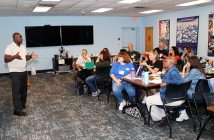Editor’s Note: CSEA’s shop stewards play a very important role in union activities. They are the face of CSEA at work sites; stewards are responsible for hearing our members’ concerns, communicating important information about our union and helping our brothers and sisters with work site issues.
In our continuing effort to spotlight these activists, and the important role they play in union activities, the “Principal Steward Profile” was born.
This month’s principal steward is Regina Steimmasell, who is an office application specialist at Longwood High School. She has been a CSEA member since 2003.
Long Island Reporter (LIR): Why did you decide to become a shop steward?
Regina Steimmasell (RS): I became a shop steward a year or two after joining CSEA. I was frustrated about some things that were going on in the office. I realized that in order to change things, I had to get involved. I didn’t want to be one of those people that complained and did nothing. I didn’t feel that I had the right to complain unless I was part of a solution.
LIR: What is the most rewarding thing about being a shop steward?
RS: Learning and understanding what our union rights are, knowing that we have rights and that on some level those rights have to be respected. As time went on, the relationships that I was able to build were very rewarding. I’ve also been able to learn a lot about what’s going on in our union. Knowledge is definitely power.
LIR: What is the most challenging thing about being a shop steward?
RS: The members who complain, but don’t want to be part of the solution. Some members have this idea that things have to be done for them, but they don’t think that they have any accountability in the way their situation turns out. That doesn’t make for a strong relationship building.
LIR: What do you do when you have to work with people who have that mindset?
RS: I’m not going to argue with someone when I can just read them their contract. At work, we live by labor laws and our contract. You can disagree with something that management is doing, but if the contract says that they have the right to do it, that’s it. Our contract is our bible.
LIR: Did you have a mentor?
RS: I’ll have to start with two retired members. I learned a lot from Christine Urbanowiecz, who served on the local and unit level. She was always very informative. Fran Nosek, who had an amazing sense of humor that she applied to everything. Her humor really helped to prevent people from being intimidated by difficult topics. I would also have to say Jim McHone, who knows the contract better than anybody that I’ve ever known, which is really useful when we’re defending people.
LIR: It takes a certain amount of trust with members at the work site to be a successful shop steward. How are you able to build that trust?
RS: I think the only way you can obtain trust is by helping someone. I was on the sick bank committee for a while, which in conjunction with helping to defend their contractual rights, is how I helped people when they were at their lowest. I gained a lot of trust from people because I fought that fight for them, in a professional way, as best as I could.
LIR: What situation made you feel like you really accomplished something important for a member?
RS: The sick bank. Our contract said that members could use days from the sick bank in the event of a catastrophic illness or injury. There were countless times when we were able to make sure that members got the substantiated documentation that they needed in order to receive the paid time off.
The members who requested time from the sick bank were going through some really hard times. They needed to know that they could pay their bills. There are people that I still see who thank me for helping them years ago. Sometimes, activists don’t feel appreciated, but you can be if you’re doing the work.
LIR: How important is relationship building in activism?
RS: It’s huge. People who work cooperatively together are unstoppable. I can’t tell you how many interpersonal issues interrupt our days. If you know how to work with people and you know how to be kind, you can get a lot more done.
LIR: How was shop steward training helpful?
RS: You get to learn about what our rights are as union members and making sure the membership knows that they have the right to union representation with them. A lot of times, members don’t know if it’s appropriate to have representation at something like an inquiry, which it is.
LIR: What advice do you have to potential shop stewards?
RS: Learn as much as you can, take a deep breath [laughs]and be nice. A lot of times, passion is mistaken for anger. When you’re really passionate about something and you really want to support a member, you can come off the wrong way. If you’re not seen as approachable, you’re not good to anybody.
You also need to know your contract and have it handy in case you need it. You need to read {publications} like the Long Island Reporter and read about local politics. You need to vote and know details about who you’re voting for and have conversations with people in your circle about the candidates.
LIR: Any final thoughts?
RS: Our members need to [realize that we]are on the same team. I think sometimes people forget that we’re all the same; we want to go to work, have our jobs protected and so on. There’s no need to be mean to each other and they forget that way too much.
— Wendi Bowie




